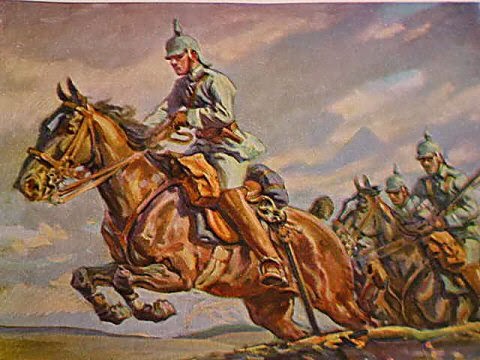Curiously enough, however, my sharpest memory of the puzzle of this patriotic paradox, and the difficulty of making others see what to me was so obvious, is not connected with Ireland or with England; but, of all places in the world, with Germany.
Some time after all these events, I had to visit Frankfurt, where I took on rather casually the task of lecturing on English literature to a congress of German schoolmasters. We discussed Walter Scott’s Marmion and other metrical romances; we sang English songs over German beer, and had a very pleasant time. But there was already stirring, even among those mild and amiable Germans, something that was not so pleasant; and though they expressed it quite politely, I suddenly found myself once more in the same difficulty about the national and the imperial notion. For, speaking to some of them at large about literature, as to a merely cosmopolitan world of culture, I touched on this preference of mine for what some consider a narrower national idea. I found that they also were puzzled; they assured me, with that gravity with which Germans alone can repeat what they regard as a platitude, that Imperialismus and Patriotismus were the same thing. When they discovered that I did not like Imperialismus, even for my own country, a very curious expression came into their eyes, and a still more curious notion seems to have come into their heads. They formed the extraordinary idea that I was an internationalist indifferent, or even hostile, to English interests. Perhaps they thought Gilbert Keith Chesterton was an alias of Houston Stewart Chamberlain. Anyhow, they began to talk more openly, but still vaguely; and there grew gradually on my consciousness the conviction that these extraordinary people really thought that I might accept or approve, on some toshy ethnological or sociological ground or other, the extension of the Teutonic Race at the expense even of the impotence or absorption of my own land. It was a somewhat difficult situation; for they said nothing definite that I had any right to resent; it was merely that I felt in the atmosphere a pressure and a threat. It was Der Tag. After thinking a moment, I said, “Well, gentlemen, if it ever came to anything like that, I think I should have to refer you to the poem of Scott that we have been discussing.” And I gravely repeated the answer of Marmion, when King James says that they may meet again in war as far south as Tamworth Castle.
Much honour’d were my humble home, If in its halls King James should come; But Nottingham has archers good, And Yorkshire men are stern of mood; Northumbrian prickers wild and rude. ... And many a banner will be torn, And many a knight to earth be borne, And many a sheaf of arrows spent, Ere Scotland’s King shall cross the Trent.
I looked at them and they at me, and I think they understood; and there rose up like an enormous shadow over that drinking-hall the terror of things to be.

No comments:
Post a Comment